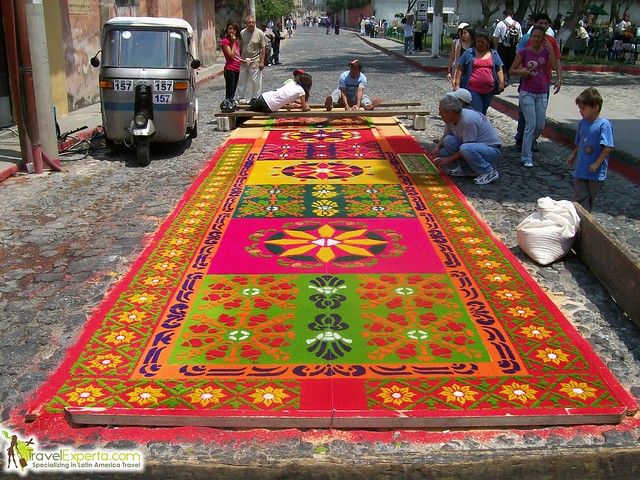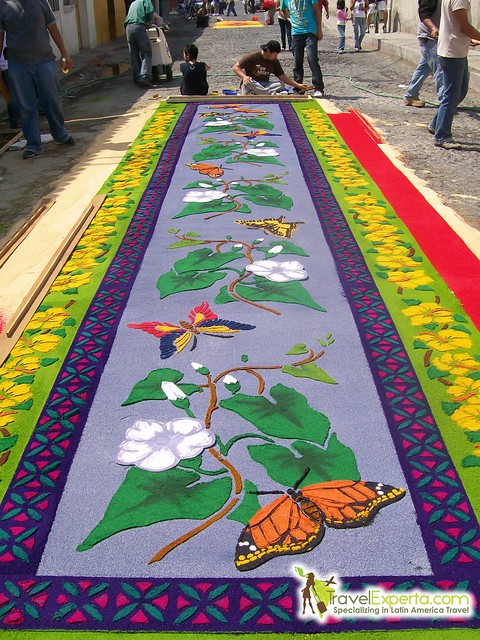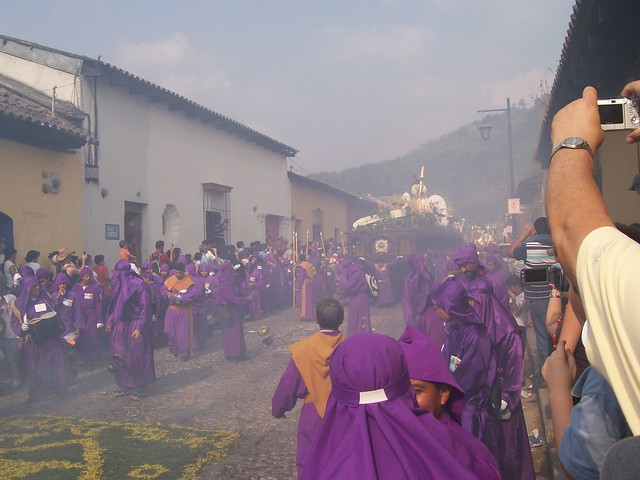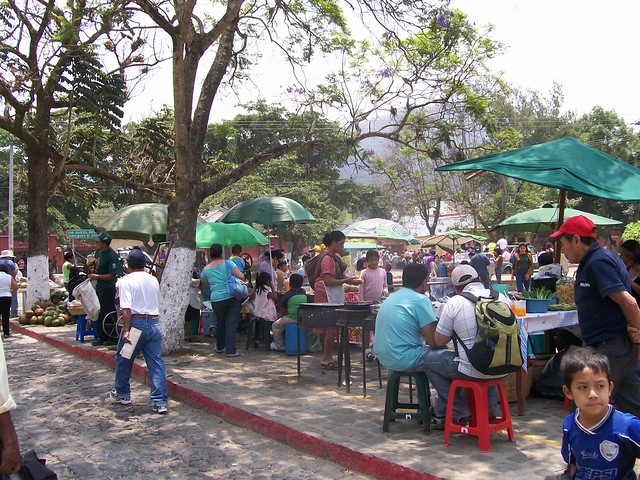Guide to Semana Santa (Holy Week) in Guatemala
0 View
Share this Video
- Publish Date:
- June 3, 2022
- Category:
- HOW TO -
- Video License
- Standard License
- Imported From:
- Youtube
Tags
Sponsored Area
TODAY'S ADVENTURE
Guide to Semana Santa (Holy Week) in GuatemalaSemana Santa in Guatemala
Semana Santa or Holy Week in Guatemala is one of the most important celebrations of the year in this tiny country. Although it’s predominantly a celebration for Catholics, travelers of all religions and beliefs can experience this great opportunity to see art in a very particular way. Keep reading to learn more about Semana Santa in Guatemala.
This tradition was brought to America during the Spanish conquest. It is meant to represent the passion of Jesus Christ by taking beautifully crafted images of Jesus and Mary out on processions. It is the most important and busiest week in the country and the best time to visit Antigua.

Antigua is a small city that looks as if time stood still for the last two hundred years. It was once the Capital of Central America and is now a must-visit for travelers from around the world. This place comes alive with smells, colors, food, music, and processions during holy week in Guatemala.
What Makes Holy Week in Guatemala Special?
For many years to the present, La Semana Santa in Guatemala has attracted many international believers from all over the world, and that’s because of the way the locals celebrate it here. Each country celebrates it differently but nothing like Guatemala, from alfombras to the cucuruchos and many more.
Los cucuruchos y las devotas
They are the pennant devotees, taking care of carrying out the processions and the many steps of the Via Crucis. Las devotas are the female version of the devotees, also taking care of the Holy Week processions. There are many types, from several organizations and different brotherhoods, but commonly they wear robes in white, black, or purple
They take turns carrying the giant floats, why do they do this, the reasons are personal, many of them just want to thank God for something, or redeem their sins, and for tradition.Las Alfrombras
This literally means “carpets” in English, the planning of las alfrombras starts months before Holy Week, and they should be done 24h before the procession take place. The real purpose of those carpets is to be a colorful path for the profession and as an offering. It is well known that many Guatemalan families have been making alfombras for generations, many years.
Las alfombras are usually made with dust of different colors, fruits, and flowers. The pattern is a bit complicated, people usually use catholic symbols and Mayan images, also many have Guatemalan icons or natural elements. The carpets come in many sizes, from many meters to even a mile long.
The Processional Floats
Most of those structures are made of wood, they are used to carry Catholic images of Jesus Christ and different saints across the streets during Holy Week. Las andas procesionales are decorated by the devotees according to the church and organization selected theme. Since the Good Friday processions take place in the nighttime, some of the processional floats are illuminated, giving them a different touch!
The size varies a lot, some are really small and some are huge, the biggest one is located in El Calvario Church, used to carry the Cristo Yacente, with 25 meters in length and almost 2.5 tons in weight it needs to be carried by 140 cucuruchos.
The Catholic Images
What makes Semana Santa in Guatemala really amazing are the floats and the catholic images, some of the ones used for the processions are 600 years old or even more. Most of them arrived in Guatemala from Spain and other countries in Europe. They are very antique and have a lot of history with them.
The cofradias, brotherhoods, or organizations have the duty to dress the images in expensive clothing, also, they take care of the restoration and cleaning.These images are clothed in expensive robes and clothing. The cofradias (brotherhoods) are in charge of their restoration and cleaning.Holy Week in Guatemala
Actually, the celebrations start 40 days before the day when the resurrection of Jesus is celebrated. This period is called lent. On each Friday, there will be an altar in different churches (Velaciones), and on Sundays, there will be a procession, each representing a different passage of the bible.
Also, make sure to check out the carpets. They are made with sawdust of bright colors and intricate designs, and others are made of flowers, bringing about beautiful combinations. They take hours and lots of work, and get destructed in seconds as the procession passes by. These are just some of the best things to do in Antigua during this season.

Itinerary of Activities of Holy Week in Guatemala:
1. It all starts on Palm Sunday – Everywhere you look you’ll find beautiful bouquets of palms and flowers. Then during the afternoon, there is a procession from the famous La Merced Church.
2. Monday – Go for a visit to La Merced church again. There will be a huge exposition of an image on the altar – each year is different. You can also find tons of Guatemalan street food stands outside the church.
3. Tuesday – Visit San Francisco church, you will find another of these artistic representations featuring an image of Christ carrying a cross. As I mentioned before, they are all completely different.
4. Wednesday – This is a busy day! First, there is a procession from one of the nearby towns. They are floating pieces of art. Then visit Escuela de Cristo Church. You will have another velacion, but this time the image being featured is the one of the dead Christ.

5. Thursday – You get two different processions. Try to catch them as they go through the cathedral. They do a short dramatization in colorful outfits and even horses, with the full moon as the background.
6. Friday – This is the busiest day of the whole week and where you see the largest processions. Thousands of people come to Antigua to see or carry on their shoulders one of the four processions. One leaves La Merced church at 6 am. At 3 pm, the city changes from purple to black. This is when three more processions leave the Cathedral, Escuela de Cristo and San Felipe. This time they all represent the dead Christ, they are huge and solemn.
Locals don’t sleep the night of Thursday, they spend the night looking at Thursday’s processions, partying or manufacturing carpets for Friday’s processions. Then spend the whole day walking, eating and chasing the processions. This is when the best carpets are made so it is a good idea to start the day walking the streets at 5am looking at the finished carpets, just 30min before the morning procession destroys them.
7. Saturday – During the afternoon you will find two more processions on the streets of Antigua, this time featuring only the images of Virgin Mary wearing black, representing her loneliness after Jesus Christ died.
8. Sunday – It all ends with a modest yet popular procession announcing the resurrection has happened. This is a day of celebration among Catholics.

Holy Week Food
There are tons and tons of restaurants in Antigua. But during this time of the year many little parks around town have food stands. I know this might look scary, sometimes, but it is worth giving this food a chance. It is all part of the experience! All you have to do is choose carefully the stand you buy from.
What to Avoid during Holy Week in Guatemala
During this week you will find people on the streets all night, especially close to the churches open for a velacion. Antigua is also a pretty safe place, but avoid the streets if it is too late. Also avoid the areas close to the market, and the ones on the outer edges of Antigua. It can be dangerous since thieves go crazy during this season.
If you are planning a vacation in Guatemala, this is the season you want to be in. The weather is warm, it doesn’t rain, and you get to experience one of the main aspects of the culture of locals.
NOTE: Semana Santa 2022 starts on the 08th of April.
The post Guide to Semana Santa (Holy Week) in Guatemala appeared first on Travel Experta - Travel, Lifestyle, Freedom.
-
By: Marina 'Travel Experta'
Title: Guide to Semana Santa (Holy Week) in Guatemala
Sourced From: travelexperta.com/guide-to-semana-santa-in-guatemala/
Published Date: Wed, 01 Jun 2022 12:00:04 +0000
Did you miss our previous article...
https://onebagtravel.club/how-to/how-to-save-while-traveling-in-your-rv











